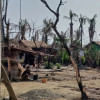UN officials for ensuring safety in Myanmar
The United Nations has warned against repatriation of the Rohingyas to their homeland without ensuring safety in Myanmar.
“People should go back, people or refugees should go back to their homes when they feel it is safe and nobody should be forced to move,” said Spokesperson for the UN Secretary-General Stéphane Dujarric during a press briefing in New York on Tuesday.
Stéphane said this in response to a question on the situation deemed by UN human rights chief Zeid Ra'ad Al Hussein, who warned against premature repatriation of Rohingyas in a Special Session of the UN Human Rights Council in Geneva on Tuesday.
“I think the Secretary General has been upfront and extremely vocal about the sufferings of the Rohingyas, the sufferings they underwent while living in Myanmar and their plight, their current plight now.
“I think everyone in the UN system agrees on the fact that no-one should be repatriated against their will, that refugees should go home to their place where they came from and in an atmosphere that is free and that respects their rights,” said the Spokesperson.
Earlier on Tuesday in Geneva, Zeid Ra'ad Al Hussein warned against premature repatriation of any refugees in absence of sustained human rights monitoring on the ground and without first addressing the root causes of the crisis.
He cited a similar situation in the 1990s when refugees who fled Rakhine started to return but were again forced to take flight.
Bangladesh and Myanmar have signed an agreement on November 23 to begin in two months repatriation of hundreds of thousands of forcibly displaced Rohingyas who fled Myanmar and took shelter in Bangladesh in the face of horrendous atrocities.
Earlier, the UN Refugee Agency, UNHCR, has reported that at present, conditions in Myanmar's Rakhine state are not in place for safe and sustainable returns.
An estimated 626,000 refugees -- or more than half the estimated number of Rohingyas living in Rakhine -- have fled to Bangladesh since October 2016, and particularly since August 2017.
The UN Office of the High Commissioner for Human Rights (OHCHR) sent three teams to Bangladesh this year to monitor the situation and interview the refugees.
The witnesses reported acts of appalling barbarity including deliberately burning people to death inside their homes; murders of children and adults; indiscriminate shooting of fleeing civilians; widespread rape of women and girls; and the burning and destruction of houses, schools, markets and mosques.

 For all latest news, follow The Daily Star's Google News channel.
For all latest news, follow The Daily Star's Google News channel. 








Comments